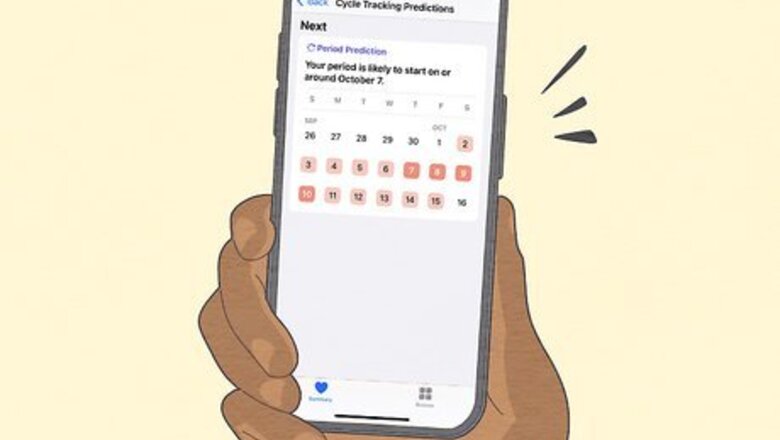
views
- Track your menstrual cycle and take note if you miss a period, as this is a common sign of pregnancy.
- Pay attention to physical symptoms, such as sore or swollen breasts, cramping, spotting or vaginal discharge, and frequent headaches.
- Take note of any newly developed aversions to certain smells and foods. Similarly, see if you feel any strong cravings for certain foods.
- Take a pregnancy test and talk to your doctor for an accurate diagnosis.
Checking for Hormonal Changes
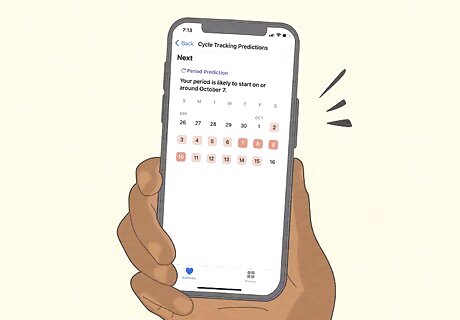
Track your menstrual cycle and see if you miss your period. Pregnant people do not menstruate during the course of their pregnancies. Missing a period is usually the most obvious indicator that you’re pregnant. Nonetheless, you can miss periods for other reasons, such as stress or even overexercising. If you don't already, get in the habit of keeping track of your menstrual cycle so that you can better detect a late or missed period. Mark when your period starts and ends on a calendar. That way, you can see how frequent and long your cycle generally runs. There are also mobile apps that make it convenient and easy to track your cycle.
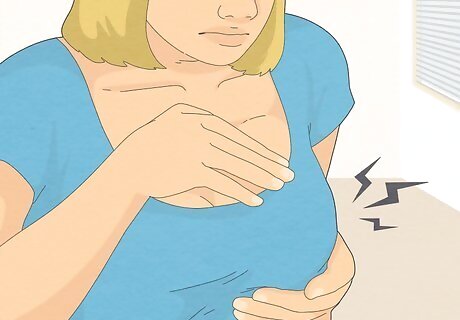
Feel for swollen or painful breasts. Because of the hormones released in early pregnancy, you may notice some changes in your breasts. They may swell slightly or be somewhat sore to the touch. You may also notice that your breasts feel "fuller" or heavier. Your nipples may feel swollen, painful, or tingly.

Look out for spotting in your underwear. You may notice spottings of blood during implantation, or when the newly fertilized egg attaches itself to the wall of the uterus. Implantation usually happens within a week to a week and a half after conceiving. This symptom can last for about 3 months. Spotting is usually lighter in color than your menstrual blood. This type of implantation bleeding usually occurs around the time you would expect to have your period. Not everyone experiences spotting.
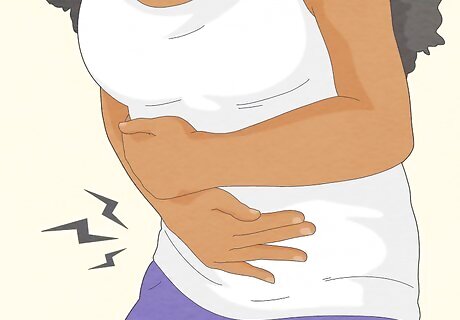
Take note if you experience any cramping. These cramps often feel like the ones you experience during your period. However, if they’re particularly intense and painful, or if you notice that they’re just on one side of your body, it can be a sign of a complication. Contact your doctor immediately if you suddenly experience severe cramps.

Monitor if you’re feeling more fatigued than usual. Many people feel extremely tired in the early stages of pregnancy. This symptom is usually attributed to increased progesterone levels. It may also be caused by the fact that your body is producing more blood to account for the baby. You may notice this symptom as early as 1 week after conception.
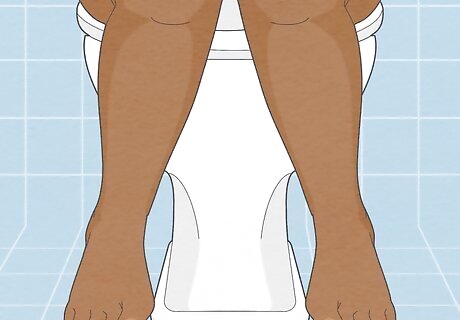
Pay attention to how often you urinate. Another early sign of pregnancy is frequent urination. When you become pregnant, your body produces more of the hormone human chorionic gonadotropin (hCG). This hormone, which is highest in the first few weeks of pregnancy, pushes more blood to your groin area, causing you to need to head to the bathroom more often. On the other hand, another possible sign of pregnancy is constipation. This can happen during any trimester of pregnancy, and it can appear as early as the second month of pregnancy.
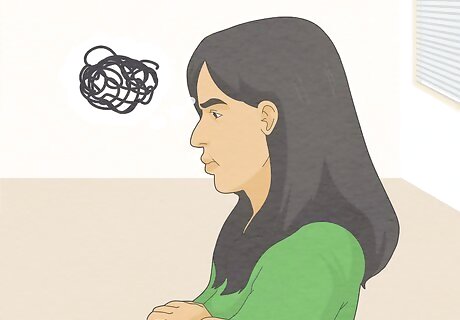
Watch for moodiness and irritability. Pregnancy hormones can do a number on your moods, just like they do when you have your period. If you’re feeling extra moody or irritable, it could be a sign you're pregnant. This symptom can appear 2 to 3 weeks after you conceive.

Note if you feel any dizziness. Another early symptom of pregnancy is feeling dizzy or lightheaded. Mostly, this symptom is caused by hormonal changes. However, it can also be caused by a difference in how much blood your body is producing.
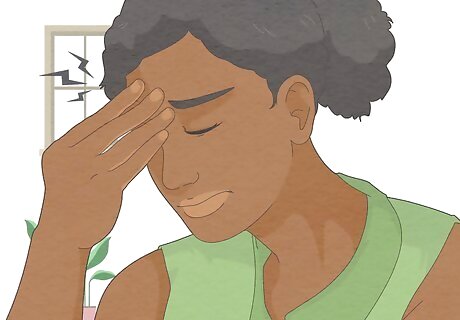
Monitor for an increase in headaches. Sometimes, a headache is just a headache. However, an increase in headaches can be an early symptom of pregnancy, due to hormonal changes in your body.
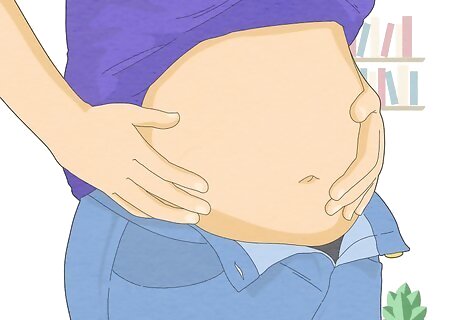
Take note if you’re feeling more bloated and gassy than usual. The increase in hormones due to pregnancy can make your stomach feel bloated. You might also notice that you’re passing gas more often than usual.
Paying Attention to Other Symptoms

Note if you have morning sickness or a frequent upset stomach. Morning sickness can strike early in a pregnancy. Despite its name, morning sickness doesn't just happen in the morning. You may have an upset stomach any time of day and may also experience some vomiting. This symptom can strike as early as 2 weeks after conception.

Be aware if certain smells or foods start to bother you. A common symptom of pregnancy is developing a change in food preferences or an overall decrease in appetite. You may start noticing you suddenly don't like certain foods or smells, even if you were totally fine with them the day before. Your aversion may be strong enough to cause you to become nauseous.
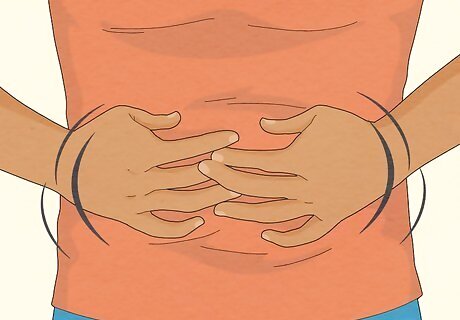
Notice if you’re feeling more hungry than usual. Often, you will find you’re much hungrier if you’re pregnant. If you notice you’re eating more than normal and still find yourself hungry, you may be pregnant. Some people describe this symptom as a constant hunger.
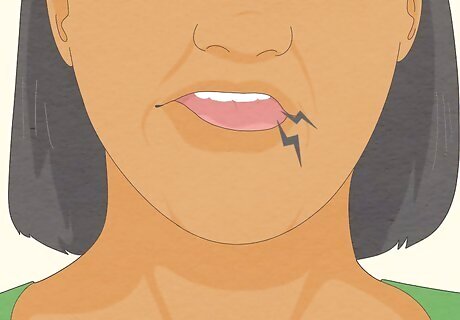
Look out for a metallic taste in your mouth. This symptom is especially prevalent in the early stages of pregnancy. It’s usually caused by a shift in hormones and is typically harmless—just maybe a bit unpleasant.
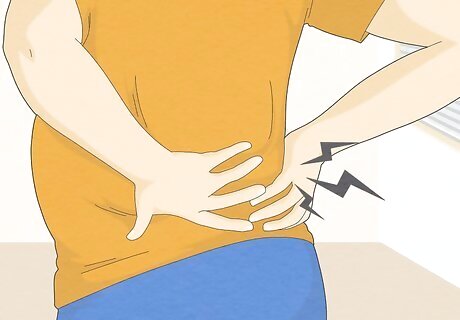
Pay attention to any back pain. During pregnancy, the ligaments in your body become softer in preparation for the birth, which ends up putting some strain on your back. Therefore, it’s normal to feel pain in your lower back or pelvic area when you’re pregnant, especially in the early months.

See if you have strong cravings for certain foods. Pregnancy makes you simultaneously avoid certain foods and crave others. Of course, everyone gets a craving for a certain food every now and then, but pregnancy cravings tend to be more intense.
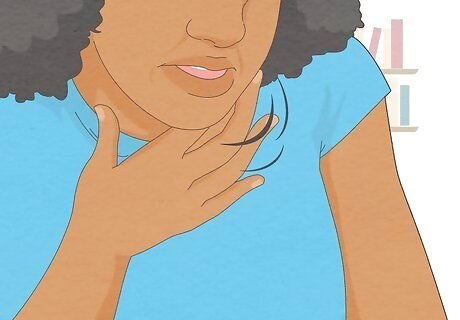
Monitor for any shortness of breath or other breathing problems. In the early stages of pregnancy, you may notice you get out of breath more quickly. Usually, this symptom is mild. However, severe chest pain or shortness of breath that doesn’t go away can be a sign of a serious medical complication. Call 911 or go to an emergency room right away if you have these symptoms. To help with any shortness of breath, sit up straight, sleep propped up on a pillow, move at a slower pace, and rest when you need to catch your breath.



















Comments
0 comment